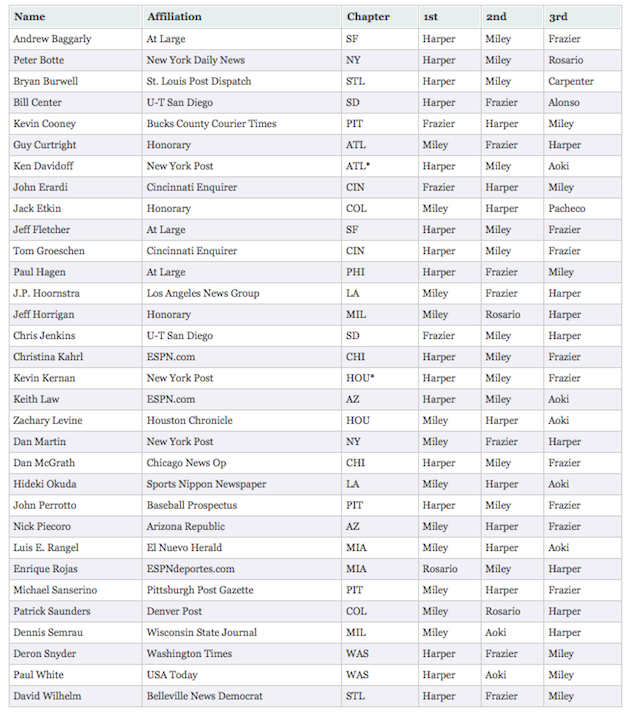The Baseball Writers Association of America, whose contract with Major League Baseball references as many third-party transactions with Satan as Fox’s World Series contract and the liner notes to a Robert Johnson collection combined, has declared its intentions to make future baseball award votes more transparent than in the past.
Sure enough, the BBWAA released all individual ballots for last night’s Rookie of the Year voting. While it seems like transparency can only help to legitimize a process that has been under scrutiny longer than Strom Thurmond’s voting record, a glance at the RoY voting suggests that we may be in for some trouble. See why after the jump.
No NL Rookie was so far ahead of the pack as to make this one a foregone conclusion, as Mike Trout did with the AL Rookie of the Year (along with the Oscar for Best Actor and the Nobel Prize in Physics). Bryce Harper (5.0 rWAR, 4.9 fWAR) and Wade Miley (3.2, 4.8) were roughly each other’s equivalent in opposing disciplines, while Norichika Aoki (2.9, 3.3), Zack Cozart (2.4, 2.7), and Todd Frazier (1.9, 2.8) compiled resumes worthy of a long look for a third place vote.
Predictably, Harper and Miley split the majority of the first place votes, with Harper taking 16 and Miley 12, and the majority of the second place votes, of which Miley received 13 and to Harper’s 8. If you know there were two voters representing each NL team, you may have noticed that 15 of them missed the memo about the two-man race. I’m not here to judge them, or at least to judge those who were more impressed by Frazier’s 120 wRC+ (one point shy of Harper’s) than by Miley’s season. Several even put Frazier ahead of Harper, perhaps giving a nod to his 21-point edge in slugging percentage (though I’ve seen the argument that Frazier single-handedly kept the Reds’ season alive during Joey Votto’s injury a few too many times in the past two days).
One voter, Enrique Rojas, even saw fit to bestow a first place vote upon the Rockies’ Wilin Rosario, who hit well for a catcher (111 wRC+), but was the worst defensive catcher in baseball, at least according to Matt Klaassen at Getting Blanked (a must-read), leaving him with 1.9 rWAR and 1.8 fWAR. I’m not particularly bothered by differences of opinion in the voting for this award. What stands out, though, are some of the chapter affiliations of the voters whose votes were more suspect. Check out this chart, courtesy of CBS Sports:

Three voters found a reason to vote for Frazier ahead of both Harper and Miley, which is perhaps not insane, but requires a general disregard for fielding metrics (Harper’s had 9.9 FRAA to Frazier’s -1.9) and stolen bases (18-3, though Frazier had an edge in non-steal baserunning) and a willingness to attribute far too much team success to a single player (and perhaps to ignore some of the Nationals’ MLB-best 98 wins). One of the three was Cincinnati’s representative. Cincy’s other voter put Harper and Miley first and second, but made room for Frazier.
Aoki would have been my third choice, and wasn’t a crazy option for a second-place vote, but you’ll note that of the two voters who placed him second, one represented Milwaukee. Rosario got a second-place vote from a Colorado voter. The other Colorado voter put Jordan Pacheco, a .2-win player with below average offense (93 wRC+) and atrocious defense (-11.3 FRAA) third on his ballot. Yonder Alonso’s only third-place vote came from a San Diego voter. There’s a vote for Matt Carpenter on there too. Oh look, that guy’s from the St. Louis Post-Dispatch.
Both Washington representatives voted for Harper. The Arizona voters split their votes, but wait- one of them is Keith Law? Former Blue Jays employee and current ESPN snarkster Keith Law takes one of the spots for an Arizona writer?
There’s no reason to throw a fit over a local writer throwing a third-place vote to a hometown guy in a race where third place was wide open. But after seeing the individual ballots for a relatively controversy-free award, I’m not sure I trust the process more than I did before. Is there an expectation that every voter will skew his picks toward his hometown team? If so, does a player suffer if one of his hometown guys issues an objective ballot and leaves him off? The two Cincinnati candidates had two Cincinnati Enquirer writers on their side (though Cozart was still somehow shut out), while most other teams seemed to be represented by one local writer and one national writer who was shoehorned into a jurisdiction.
This may feel like a non-story, but we’re two days away from Miguel Cabrera winning Mike Trout’s AL MVP Award. If the voting is close, and all the Detroit voters put Cabrera at the top of their ballots, fans looking for a target for their travesty-induced rage will have names at which to spew their vitriol, rather than a faceless take-back-the-RBI movement. I’m not sure that’s a good thing.
